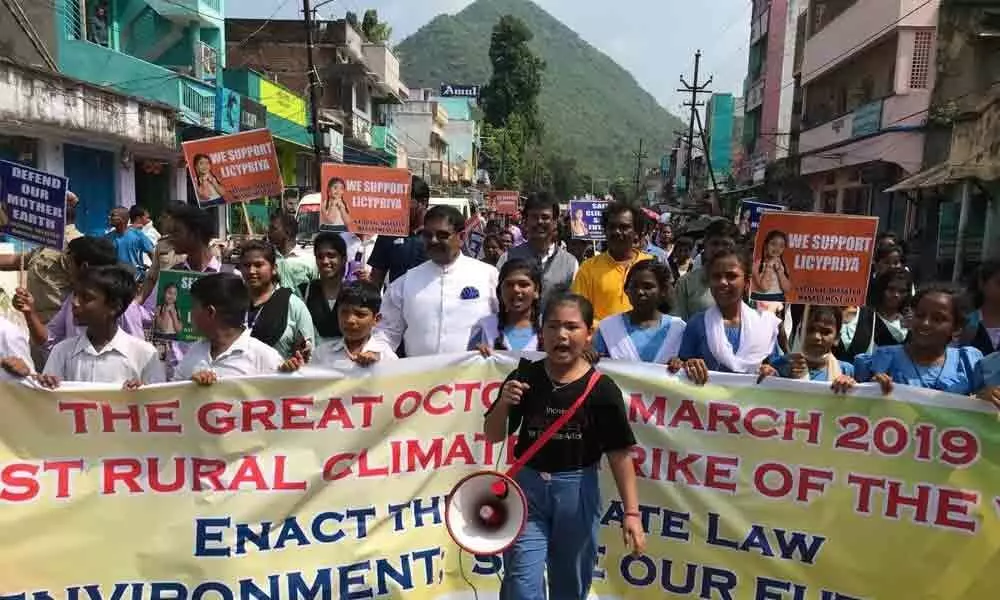Don't call me 'Greta': Young climate activists demand to be heard

Young campaigners say they have had enough of being dubbed their country's ‘Greta’, as the world's media track every move by Swedish activist Greta Thunberg, 17, known for starting the school strike movement and berating leaders over climate change.
Young campaigners say they have had enough of being dubbed their country's 'Greta', as the world's media track every move by Swedish activist Greta Thunberg, 17, known for starting the school strike movement and berating leaders over climate change.
Last week, 8-year-old Licypriya Kangujam from India's remote northeast hit out at journalists on Twitter for calling her the 'Greta of India', saying she was not trying to imitate Thunberg.
Award-winning Kangujam told the comparison was unfair and hurtful, and undermined her work with 'The Child Movement' which she founded in July 2018, before Thunberg started her weekly demonstrations outside Parliament.
"If you call me Greta of India, you are not covering my story. You are deleting a story," Kangujam said in emailed comments.
This week, she clambered on an excavator in Bengaluru city, where she is now based, to stop the felling of more than 8,500 trees to widen roads and was due to launch a new electric car line with Indian business tycoon Anand Mahindra at an auto show.
Over the past year, the trend of young climate activists being portrayed as their national version of "Greta" has become common, a description Kangujam said erases "unique stories, identities, names and movements".
"Developing nations are the most vulnerable to climate change. The world and the media need to focus equally (on) all climate activists of the world," she emphasised.
Scientists say communities in developing countries and small island states are on the frontline of climate change damage, from frequent droughts and heatwaves to floods and rising seas.
India was ranked as the fifth most weather-affected country in a climate risk index by environmental think-tank Germanwatch last year.
In 2018, the South Asian nation suffered one of its longest-ever heatwaves, bringing water shortages, crop failures and riots, on top of monsoon floods and two strong cyclones, Germanwatch said in its report.
Kangujam's comments came in the wake of Ugandan climate activist Vanessa Nakate, 23, being cropped out of a news agency photo taken with white campaigners, including Thunberg, at January's World Economic Forum in Davos.
The incident sparked a fierce debate over race and representation in the media.
To help, Thunberg last week took part in a press conference where she herself said little, aiming to instead focus attention on climate threats facing Africa, after young Africans who tried to spread that message at Davos were largely overlooked.
"This is the time for the world to listen to the activists from Africa and to pay attention to their stories and take action where it's needed," Nakate told journalists in Stockholm and online.
Back in 2014, Green 2.0, a U.S. advocacy campaign to increase diversity in environmental groups, found that people of colour made up no more than 16% of staff in close to 300 U.S. environmental organisations studied.
A follow-up report in 2019 revealed that the top 40 environmental foundations had become even "more white".
The ongoing lack of minority representation risks silencing young voices in marginalised communities that are already disproportionately hit by climate change, environmentalists said.
Jennifer Morgan, head of Greenpeace International, warned there was a big danger of policymakers bringing in laws to deal with climate change that did not protect vulnerable groups from climate effects nor from the negative consequences of response measures.
"The climate emergency is a global crisis, but it is impacting low and middle-income countries the worst," she said.
"The media must step up and stop focusing on just one activist," she added in emailed comments.
While they push for more attention to their own work, many young activists acknowledge Thunberg has been a source of inspiration for them and has ignited much-needed public protest over climate change among younger generations.
In August 2018, Thunberg started skipping school every Friday to highlight the issue, standing with a handwritten sign outside Sweden's parliament.
She shot to global fame for inspiring worldwide student strikes calling for an urgent political response to climate change and for giving speeches that highlight the scientific evidence supporting the need to cut greenhouse gas emissions faster.
Thunberg also famously scowled at US President Donald Trump, a climate change sceptic, during a UN summit.
"She has managed to bring so many people, some already dedicated to the initiative, while motivating others to contribute as much as they could," said Sakshi, 19, a Pakistani activist who goes by one name and leads a zero waste campaign at her school in Karachi.
British telecoms regulator Ofcom on Tuesday credited the "Greta effect" for a rise in online social activism among children, finding that almost a fifth of 12 to 15-year-olds now use social media to show support for causes and organisations.
Thunberg has more than 4 million followers on Twitter and nearly 10 million on Instagram.
Despite her unwanted "Greta" sobriquet, Kangujam said Thunberg inspired her to drop out of school for a year in 2019 to focus on her campaigning and to protest outside the Indian parliament every week to demand legislation on climate change.
"When they pass a climate change law, it will benefit millions of people in the country, especially poor and marginalised communities," Kangujam explained.














